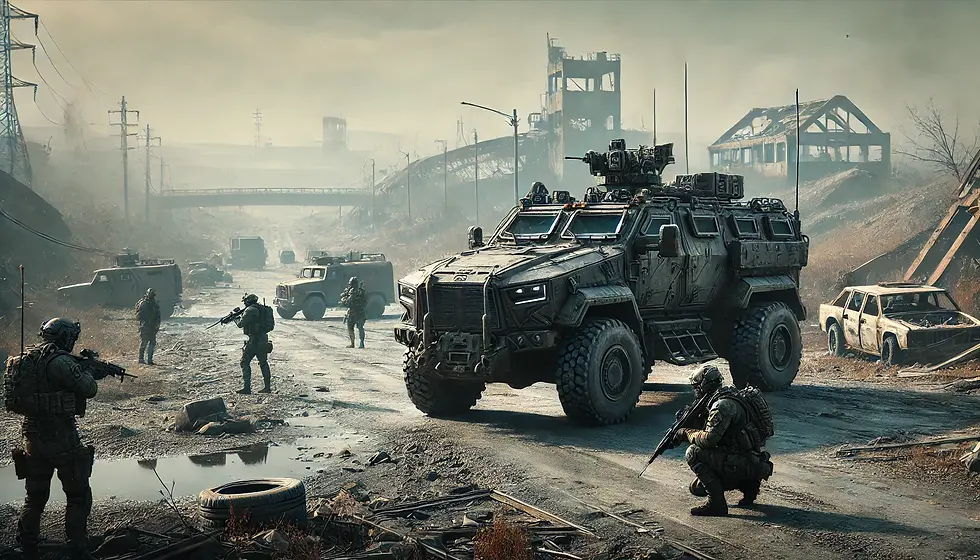C.T.P.T.U
- Ivan Tsar
- Nov 23, 2024
- 3 min read

C.T.P.T.U
Civilian Tactical Patrol Team Unit
When all else fails and all you have is your reliable & vetted community of disciplined like minded individuals , who are heavily invested to work together when society collapse's in addition to all the money you guys put together for when SHTF this situation is for you . ☢️
Due to war, economic meltdown, natural disasters, or other catastrophic events, survival becomes a top priority. In such situations, the idea of forming a tactical civilian patrol team often emerges as a way to maintain safety, order, and a semblance of structure. This article explores the concept of such patrol teams, their roles, and the advantages and disadvantages of establishing them during societal collapse.

What is a Tactical Civilian Patrol Team?
A tactical civilian patrol team consists of trained civilians who band together to protect their community, resources, and loved ones in times of crisis. These teams often employ military-style tactics, operate with clear roles, and use equipment such as firearms, communication devices, and surveillance tools. Their goal is to fill the vacuum left by the absence of law enforcement or organized governance.
Roles and Responsibilities
Security and Defense
Protecting the community from looters, armed groups, or external threats.
Securing vital resources such as food, water, and shelter.

Reconnaissance and Surveillance
Monitoring surrounding areas for signs of danger or incoming threats.
Using thermal binoculars, drones, or night vision to enhance situational awareness.
Resource Management and Distribution
Safeguarding communal resources to prevent hoarding or theft.
Overseeing equitable distribution of supplies among members.

Medical Aid and Support
Offering first aid or emergency medical care during attacks or accidents.
Ensuring team members’ health and fitness.
Conflict Mediation and Leadership
Acting as mediators to resolve disputes within the community.
Establishing a chain of command to ensure coordination.
Pros of Tactical Civilian Patrol Teams
1. Enhanced Community Safety
A patrol team provides immediate protection against threats such as bandits, looters, or rival factions, creating a safer environment for the group.
2. Organized Defense
With a clear structure, roles, and protocols, these teams can repel threats effectively, offering better protection than uncoordinated individuals.

3. Psychological Reassurance
Knowing that a capable group is actively defending the community can reduce fear and panic, fostering a sense of solidarity and hope.
4. Deterrence Factor
The presence of an armed and organized group can discourage potential aggressors, making the community less likely to be targeted.

5. Resource Protection
Patrol teams can safeguard critical supplies like food, water, and medical equipment, preventing theft or waste.
6. Skill Development
Team members can develop valuable survival skills, such as marksmanship, first aid, and tactical planning, which can be beneficial even after the crisis.

Cons of Tactical Civilian Patrol Teams
1. Potential for Abuse of Power
Without oversight, members of the team could misuse their authority, leading to oppression, corruption, or exploitation within the community.
2. Escalation of Violence
An armed group may unintentionally escalate conflicts, attracting more dangerous adversaries or engaging in unnecessary confrontations.
3. Resource Burden
Maintaining a patrol team requires significant resources, including food, ammunition, medical supplies, and equipment, which can strain already limited reserves.
4. Divisiveness
The formation of a patrol team can create divisions within a community, especially if some members disagree with its actions or priorities.
5. Risk of Targeting
A visible, armed presence might draw the attention of organized raiders or rival groups, making the community a higher-value target.
6. Lack of Professional Training
Civilians, even with some tactical knowledge, may lack the discipline or expertise of trained military or law enforcement personnel, increasing the risk of mistakes.
Key Considerations for Forming a Patrol Team
Community Consensus
Ensure that the majority supports the formation of the team to maintain unity and trust.
Clear Rules of Engagement
Establish guidelines for the use of force, interactions with outsiders, and internal accountability to prevent abuse.
Skill Training
Invest time in training team members in firearms handling, first aid, communication, and defensive strategies.
Resource Allocation
Carefully manage resources to avoid depleting essential supplies for non-combatants.
Conflict Avoidance
Prioritize de-escalation tactics and avoid unnecessary confrontations that could endanger the community.

In a societal collapse, a tactical civilian patrol team can play a crucial role in protecting a community, maintaining order, and ensuring the survival of its members. However, such teams also carry inherent risks, including potential abuse of power, resource strain, and the possibility of escalating violence. Success depends on careful planning, transparent leadership, and a commitment to the collective good.
Forming a tactical patrol team should be a carefully considered decision, with its pros and cons weighed against the specific needs and risks of the community. In the chaos of societal collapse, teamwork, vigilance, and ethical leadership can make the difference between survival and disintegration.



Comments